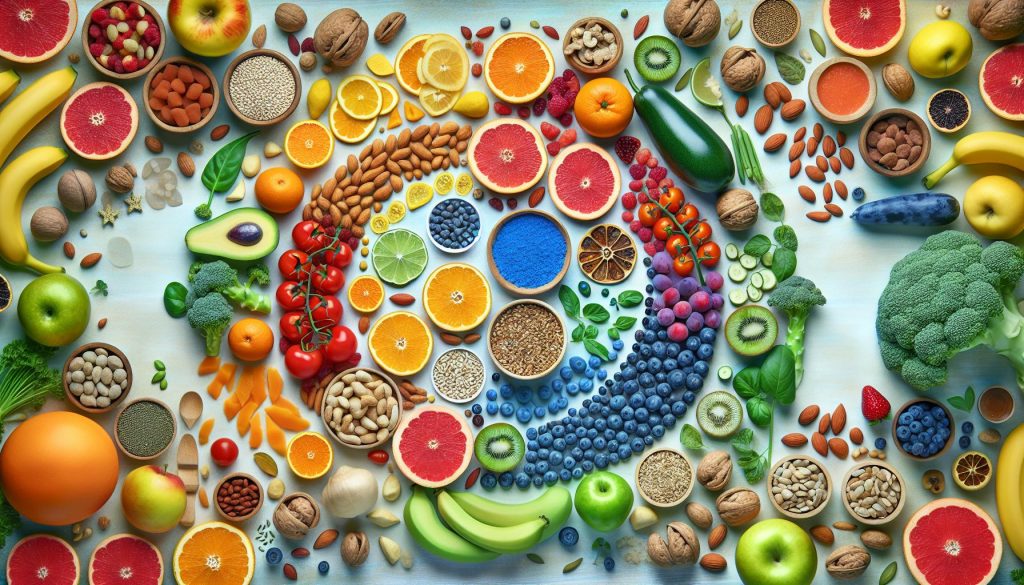
Welcome to the World of the Alkaline Diet.
Let’s delve into an intriguing dietary world, shall we? What foods, you might ask, make up an alkaline diet? Good question! In simple terms, an alkaline diet includes foods that help to balance the body’s pH level, shield against diseases, and boost overall wellbeing. Let’s dissect the specifics, as we journey through the array of fruits, veggies, and more, that not only exist in this diet but also impose a tremendous impact on our health.
Understanding the Alkaline and Acidic Principle
An alkaline diet, often referred to as acid-alkaline or alkaline ash diet, revolves around the concept that certain foods can affect the pH balance of our bodies. The term might sound scientific; however, put your worries aside because the principle is a piece of cake to grasp! Essentially, this entails jotting down a list of alkaline-rich nutrients, and the good news, it’s a list of largely unprocessed, healthy foods! An alkaline diet empowers the body by restoring pH balance, enhancing digestion, and packing our system with vitamins, antioxidants, dietary fiber, and more.
The Magic of Minerals
This diet makes a strong emphasis on minerals. It includes foods loaded with calcium, magnesium, and potassium, which helps neutralize acid and promotes alkalinity in the body. Some staple examples of these powerhouse foods include leafy greens, roots crops, citrus fruits, and legumes.
Phenomenal Fruits and Vibrant Veggies
Roll out the red carpet for fruits and vegetables in the alkaline diet! They are the real stars in this dietary narrative. Virtually all fruits and vegetables taste the zenith of this diet, with a few exceptions. As a rule of thumb, nutrient-dense, alkaline-promoting fruits and veggies like lemons, oranges, kale, spinach, broccoli, beets, and the likes, should make up a significant portion of your daily diet.
Cracking the Citrus Myth
You might wonder, aren’t lemons acidic? On face value, yes. But that’s just half the story. When metabolized by the body, lemons leave behind alkaline residues – a curious case of citrus surprise! So, don’t beat around the bush but embrace citrus fruits to add that zesty touch to your alkaline diet.
Legumes, Nuts, and Seeds
Another pillar of the alkaline diet comes from an array of potent legumes, fiber-filled nuts, and nutrient-packed seeds. These champs like almonds, flax seeds, lentils, and chickpeas, not only add an alkaline boost but also offer a wholesome protein source, especially for vegetarians and vegans.
The Power of Protein
All proteins are not created equal in the alkaline diet. Restrict consumption of animal protein – a pot of acidic trouble in your peace-loving alkaline body. But fret not, as lentils, quinoa, and tofu, amongst others, are stunning substitutes that maintain body protein levels while preserving alkalinity touch.
Conclusion
So, there you have it, folks- an easy peasy insight into the alkaline diet! Packed with bountiful beauty of fruits, veggies, nuts and seeds, and more, it’s a veritable feast that’s not just delicious, but healthy too. So why not step up to the plate by embracing this diet and claim good health as the trophy that awaits?
Frequently Asked Questions
1. Is an alkaline diet good for everyone?
An alkaline diet primarily focuses on consuming fresh fruits, vegetables, and plant-based proteins, which are beneficial for almost anyone! However, individual tolerance and health conditions matter. It’s always safe to consult with a healthcare provider before adopting a new diet.
2. Are all fruits and vegetables alkaline?
While most fruits and vegetables are alkaline, some like blueberries, cranberries, and plums have a low pH and may contribute to acidity.
3. Which beverages are part of an alkaline diet?
Alkaline water, herbal teas, green smoothies, and fresh vegetable juices ideally fit into an alkaline diet.
4. Can I eat grains in an alkaline diet?
Yes, you can. However, opt for alkaline grains like quinoa, millet, and amaranth over acidic ones like wheat and other processed grains.
5. Does an alkaline diet help in weight loss?
Indeed, it might. As an alkaline diet discourages processed foods and sugars, it may help facilitate weight loss. Additionally, the high fiber content keeps you fuller for longer, which can help control your calorie intake.



